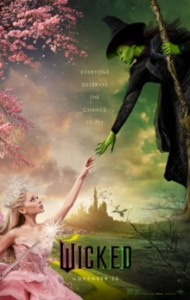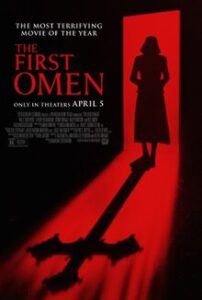Longlegs-2024
Director Oz Perkins
Starring Maika Monroe, Blair Underwood, Nicolas Cage
Scott’s Review #1,487
Reviewed August 1, 2025
Grade: A-
Oz Perkins, already making his mark in the modern horror genre with films like The Blackcoat’s Daughter (2015) and The Monkey (2025), offers an eerie little gift sure to creep many viewers out.
Add-ons like nuns, sacrifices, satan, and the like usually freak religious church-goers out, which is a testament to the achievement Perkins makes.
Giving credibility to Perkins is being the son of Anthony Perkins, aka Norman Bates from the 1960s Hitchcock masterpiece, Psycho.
That’s some horror legacy, and he gets more and more comfortable with the genre.
The story follows Lee Harker (Maika Monroe), a quiet FBI agent in the 1990s, who is tasked with tracking down an occultist serial killer responsible for murdering multiple families throughout Oregon.
Harker, reminiscent of Jodie Foster’s Clarice from The Silence of the Lambs (1991), is serious and grounded with a tinge of tension and insecurity. She has been through some trauma that could be a key to unlocking the mystery.
Does she have a secret connection to the tragic events that includes the victims sharing a birthday pattern? With her birthday approaching, things become more and more perilous.
Besides the disquieting tone of the film being filled with terror, Nicolas Cage, who produced, plays Longlegs (also known as Dale Kobble), an elusive Satanic serial killer.
On screen for only a short amount of time, Longlegs/Cage leaves an impression. With long hair and a pasty face, he looks like a cross between the Joker and Pennywise the Clown, with lipstick and a super-creepy, demonic voice.
There is something very off about him.
Buffalo Bill, the serial killer from The Silence of the Lambs, also bears a resemblance to Longlegs.
The first sequence leaves an indelible impression—a young girl on a snowy afternoon peers across her vast front yard to her family’s paneled station wagon. It is the 1970s. Suddenly, Longlegs appears and charmingly announces he forgot his long legs.
The scene made the chills run down my spine.
The atmosphere makes the film as good as it is. There is a lonely, isolated feeling throughout, like events take place in a secluded, middle-of-nowhere setting. And, this consists of both interior and exterior scenes.
Set in the Pacific Northwest, United States, specifically Oregon, the geography is perfect for a rash of patriarchal killings. Mysteriously, a seemingly normal father kills his wife and kids without hesitation. A pattern develops involving an upcoming birthday of the family’s daughter.
In an effective sequence, one of the family deaths is featured on-screen, mirroring Stanley Kubrick’s The Shining (1980). A long camera shot from far away makes the viewer feel like they’re in the room and watching voyeuristically.
Blood splays, an ax impales a victim from behind, and death and destruction have never looked finer in cinema.
Perkins incorporates a visual satisfaction that makes the film work, especially given the horror genre.
The fact that Longlegs, the villain, is frightening to look at makes the film a significant win and probably Perkins’ best work.
Yes, the story has a surprise ending, including one character’s deal with the devil. The final plot summation is shocking but rather far-fetched. While gripping, it doesn’t seem possible, and a supernatural suspension of disbelief is required.
The occult and spiritual possession are the ingredients that make Longlegs startling but not realistic.
Special shout-outs to actors Kiernan Shipka and Alicia Witt, who brilliantly portray their minor yet monumental characters with top-notch acting.
What Longlegs (2024) lacks in making sense—a common theme among modern horror films with camera-heavy trimmings over storyline plausibility, if I’m being honest—it succeeds with a visual wizardry.
The mood of terror is the film’s most significant victory.






















